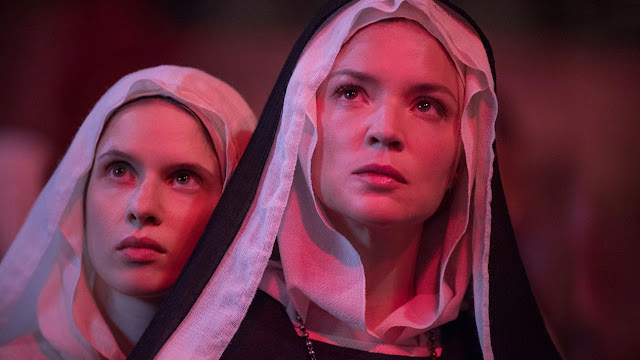I think it’s a disservice to think of Paul Verhoeven’s film Benedetta as “loosely based” on Judith C. Brown’s Immodest Acts: The Life of a Lesbian Nun in Renaissance Italy. The source material is based on records from the Investigation into Benedetta Carlini’s mystic visions, containing witness statements from those who knew her, statements that were likely obtained at the very least under severe pressure, if not torture (Verhoeven being Verhoeven, he hints at a particularly depraved form of it). The facts unveiled by the investigation allow many possible interpretations, and Verhoeven’s is surprising in its tenderness for the relationship between Benedetta and Bartolomea, and deeply intriguing if read as the history of an elaborate 17th century con job set in a convent. The brilliance of the film lies in its ambiguity about the con artist herself – her vivid visions become real on screen, while the methods she uses – perhaps – to fool others into thinking her a genuine mystic remain mostly hidden or hinted at, mostly only seen by Bartolomea, who is her lover but not her confidante.
Brown’s historical book can’t answer the question of whether the love between Benedetta and Bartolomea was genuine – it wouldn’t have been a question that the Inquisition wanted answered, which only salivated over detailed descriptions of the acts they may have committed (and Bartolomea would have risked her life if she had not confessed to being a victim). There are clear, genuine emotions in the film, and more so, deep desire and joy in mutual recognition. There is also a weird sense of humour here that befits a film that is, in a way, a satire of religion (the morally depraved clergy, the over-the-top rituals) – the viewer can easily guess what will become of the conveniently shaped statue of the Virgin Mary, a moment that shocks one of the more true-hearted nuns, deeply dedicated to the now-demoted old abbess, into suicide.
There is little question here about why a woman in Benedetta’s position would do what she did. Historically, her father promised her to a convent when she miraculously survived her own birth, but once she is old enough to begin her life in the convent, it becomes almost immediately clear that this isn’t about faith or dedication to god. Instead, the abbess (played by Charlotte Rampling, who has her own riveting story arc here, and a final scene to remember) shrewdly negotiates a price for admitting the girl, showcasing that she is running the convent like you would a business. When Benedetta begins having visions and build a reputation for herself, the abbess embraces it because it means political influence for her convent and a convenient argument to broaden the power of her superiors. One of the main goals of the later investigation into these visions is to determine if they were sent by god or the devil, the only axis of truth the Church operates on, and the main argument against Benedetta is the fact that these visions are deeply self-serving for her – they demand that she be treated with respect, be given power (in reality, at one stage, the nuns stage an elaborate wedding ceremony between her and Jesus – a spectacle that is omitted in the film). For her, personally, they are an act of rebellion, as everyone around her is determined to teach her that true faith is obtained through suffering, while her visions come closer to sexual desire and ecstasy, and eventually lead to her relationship with fellow, if reluctant, nun Bartolomea (definitely not reluctant in her attempts to seduce), who escapes to the convent from her rapist father.
Beneath the visions she experiences, there is a profound sense for the politics of the (very brutal, especially for women) world she lives in, comprehending that the only way she can live with a shred of dignity and power is to become revered in this only way that is open to her as a woman. When she has a convenient vision to warn the village from the plague that has broken out, and promises to protect them from it if only they listen to her (and it’s such good, effective advice – close the gates, don’t let anyone in), it’s a political move more than anything. So is her later realisation, when things are falling apart, that the man who is about to condemn and burn her has already been infected (an ominous tick on his leg, centuries before scientist figured out what carried the black death so efficiently) and has made himself vulnerable to the outrage of the people through the threat he poses to their lives.
In the end, brilliantly, Benedetta proves herself a con artist who has bought her own story too much. Instead of escaping into a possibly happy, simple life, she goes back to the place where she once held power. The film spares us her denouement, leaves us with the look of disbelief and awe in her lover’s face.
2021, directed by Paul Verhoeven, starring Virginie Efira, Daphne Patakia, Charlotte Rampling.


No comments:
Post a Comment